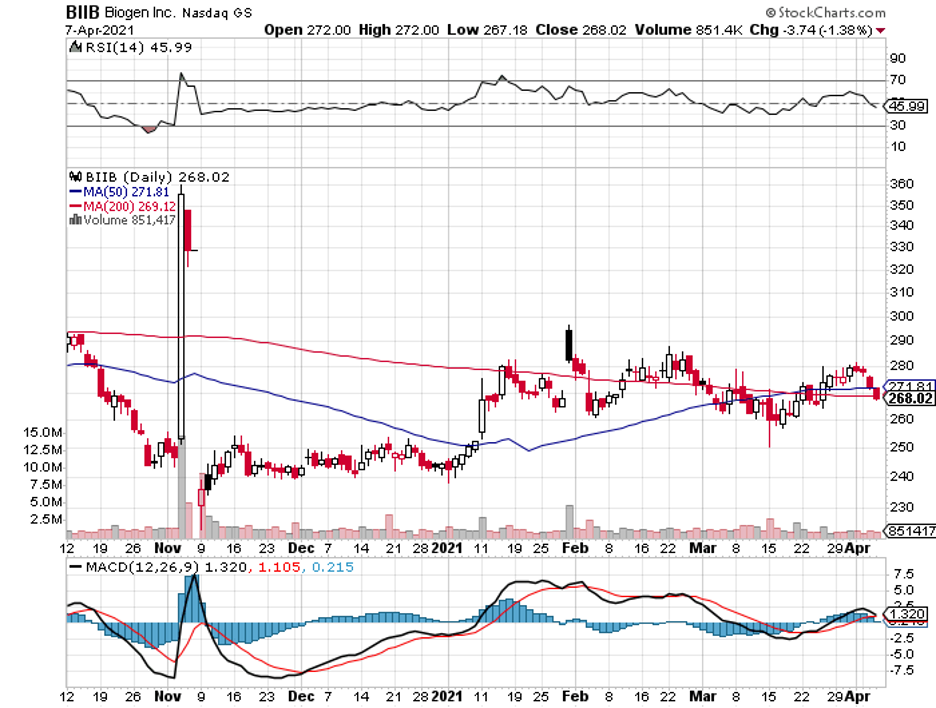Bet On This Biotech Stalwart
Biogen’s (BIIB) move to develop the first approved treatment for Alzheimer’s disease remains the biggest story in the biotechnology industry.
Now, we’re down to the waiting part of the process as the US Food and Drug Administration reviews the drug, Aducanumab.
If successful, then Aducanumab could generate a whopping $12 billion in peak sales.
The approval could also push Biogen stock up to $400. Meanwhile, a failure could let it spiral to $200.
Aside from the United States, Biogen has also applied for approval in Europe and Japan.
Apart from Aducanumab, Biogen has another Alzheimer’s disease treatment candidate, Gosuranemab.
For comparison, Aducanumab targets the amyloid plaque in the brain while Gosuranemab targets another kind of brain protein, called tau. This candidate is currently undergoing a Phase 2 trial, with results expected to be released by June this year.
While there’s still not much to go on in terms of the efficacy of Gosuranemab, positive data from its study is estimated to push Biogen stock to reach into the $350 ballpark if we base it on previous movements involving Aducanumab.
Although Biogen is definitely the face of the race to find an approved treatment for Alzheimer’s disease, it’s not alone.
To date, its strongest competitors are Eli Lilly (LLY) with Donanemab and Roche (RHHBY) with Gantenerumab.
Outside its Alzheimer’s disease programs, Biogen has been working with Sage Therapeutics (SAGE) on another potential blockbuster.
The two companies have been developing a depression drug, Zuranolone, and the data so far have offered promising results.
Like Gosuranemab, Biogen expects data on the study in the first half of 2021 as well.
If the study on Zuranolone turns out positive results, then Biogen shares are projected to jump by as much as $72.
While all these are promising, less aggressive investors may not find Biogen a suitable investment at this point. Evidently, the stock brings with it a lot of risks.
Aside from the uncertainty of its Alzheimer’s programs, there’s also the ongoing patent battle involving one of its top-selling drugs, multiple sclerosis treatment Tecfidera.
When the company lost its patent exclusivity, the FDA started to approve generic versions of Tecfidera.
This is a major concern for Biogen since Tecfidera is a substantial revenue source.
For context, this drug generated $4.4 billion in sales in the US in 2019 alone. By 2020, sales dropped to $2.6 billion.
Now, sales for this drug are estimated to reach only $1.6 billion in 2021.
While Biogen appealed its loss of patent exclusivity, the company has already taken steps to continue benefiting from Tecfidera’s success.
An obvious effort is the launch of a newer and more potent multiple sclerosis drug, Vumerity.
To attract patients and retain its customers, Biogen has been marketing Vumerity as a more powerful and effective version of Tecfidera.
In terms of the uncertainty brought by Aducanumab, it’s true that gaining FDA approval would have the Biogen stock skyrocketing.
However, rejection won’t be as devastating to the stock. While shares are expected to fall if that happens, the suffering would be short-term.
In the long run, Vumerity will gradually gain traction and eventually reach the level of success of Tecfidera, while the rest of Biogen’s pipeline programs hold the potential to add to the company’s revenue stream.
After all, Biogen is one of the first names that comes to mind when you hear the word “biotech.”
Founded in 1978, this biotechnology company has amassed a market capitalization of more than $40 billion and multiplied its annual profit to over 200%.
While its gamble on finding a treatment for Alzheimer’s disease is a risk that not a lot of investors would be willing to take, Biogen still holds one of the most promising pipeline programs in the industry and a portfolio of existing drugs with notable potential.
Going forward, approval for Aducanumab would mean a massive year for shareholders of Biogen.
If not, then this is still a respectable company with strong rewards and worth investing in, especially if you buy the dips.


